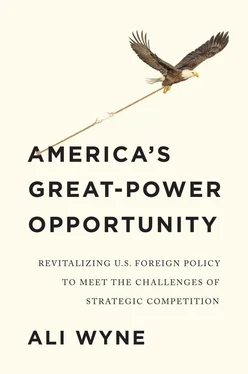The Follies of Triumphalism
The Trump administration rightly argued that the landscape it confronted was a far cry from the soaring prophecies that had pervaded much US commentary in the aftermath of the Cold War, and key trends that it spotlighted have endured. Democracy, for example, is under growing stress. Freedom House reported in 2021 that “[c]ountries with aggregate [freedom] score declines … have outnumbered those with gains every year for the past 15 years,” warning that 2020 contributed to “a new global status quo in which acts of repression went unpunished and democracy’s advocates were increasingly isolated.” 52While technological advances have aided those who seek to hold power to account, they have also proven far more conducive to the consolidation of authoritarian rule than most observers would have predicted at the turn of the century—or even in the early 2010s, when a series of revolutions across the Arab world spurred renewed optimism over the political power of social media platforms. “Between 2000 and 2017,” according to a recent study, “37 of the 91 dictatorships that had lasted more than a year collapsed; those regimes that avoided collapse had significantly higher levels of digital repression, on average, than those that fell.” 53Chief among them is China, which, harnessing artificial intelligence-powered surveillance, has built a sophisticated apparatus for ensuring that it can censor information as it sees fit, prevent mass mobilizations that might challenge the CCP’s authority, and still give Chinese “netizens” a release valve for airing their grievances. Having defied many prognostications of collapse, the CCP is now one of the longest surviving authoritarian parties in history.
Forecasts of deglobalization are overwrought, but resistance to integration—geographic, technological, and geopolitical—is growing. According to Elisabeth Vallet, there were fifteen border walls in 1989; today there are at least seventy. 54Deteriorating relations between the United States and China, meanwhile, have led many observers to conclude that some degree of decoupling between the two countries’ economies is inevitable and has the potential to fracture global supply chains and even to produce technological blocs that may operate on the basis of different norms, standards, and arrangements. And countries as diverse as Austria, Brazil, Hungary, India, Poland, and Turkey are witnessing a revival of what Jan-Werner Müller calls “nationalist populism,” which threatens to yield “more closed societies and less global cooperation to address common problems.” 55
Finally, it seems highly misguided, in retrospect, to have hoped that either China or Russia would accept the post-Cold War settlement. Beijing was unnerved by the Soviet Union’s dissolution and continues to study it. The speed with which the United States defeated Iraq during the Persian Gulf War and the ease with which it conducted maritime operations in the vicinity of mainland China in the 1990s—perhaps most vividly during the 1995–6 Taiwan Strait Crisis—impressed upon the CCP that it had to accelerate the modernization of China’s armed forces in order to preempt challenges to its rule. Moscow, of course, viewed the disintegration of its erstwhile imperium as a colossal indignity, taking umbrage at Washington’s assertion that America’s conception of exceptionalism illuminated the path to a more just future. Russia felt further aggrieved by the discrepancy between its own experiences during the 1990s, marked as they were by economic hardship and societal convulsion, and those of the United States, characterized by growing prosperity and geopolitical ascendance.
At the beginning of 2000, amid discussions of purported US unipolarity, Condoleezza Rice argued that one of the country’s five central tasks was to develop “comprehensive relationships with the big powers, particularly Russia and China, that can and will mold the character of the international political system.” 56Their grievances did not register as loudly in the first two decades after the Cold War, in part because America’s margin of preeminence was much more significant. Today, though, Beijing and Moscow are considerably more capable of channeling long-lived dissatisfaction into meaningful resistance, individually and collectively. China possesses the world’s second-largest economy and is both the largest exporting and the largest trading country. It occupies a commanding position within the vast mesh of global supply chains, and its Belt and Road Initiative has deepened its commercial heft across vast stretches of the developing world. Investing heavily in the development and application of frontier technologies, China is emerging as a center of global innovation. It is rapidly modernizing its armed forces and continues to militarize the South China Sea on the basis of a “nine-dash line” that the Hague unanimously ruled illegal in July 2016. It is also using economic coercion and aggressive diplomacy to make the world more conducive to authoritarianism.
As for Russia, it continues to threaten provocations along its own periphery, to inflame social divisions in western democracies, and to prop up Assad in war-ravaged Syria. And, while the entente between Beijing and Moscow may not be a natural one—their historical interactions give them reasons to be suspicious of each other and their national interests sometimes diverge—it is nonetheless gaining momentum.
The Need for an Affirmative Vision
Great-power competition would appear, then, to have clear virtues as an organizing principle of US foreign policy. It distills, in broad brushstrokes, a core element of contemporary geopolitics, intensifying strategic tensions between the world’s most powerful democracy and two significant authoritarian competitors. Because it occupies a central role in high-level government documents such as the NSS and the NDS, it lends coherence to interagency priorities and efforts. And, in keeping with Kennan’s Council on Foreign Relations address, it puts policymakers in a familiar frame of mind: that of dealing with a menacing other (or others, in this case).
Certain realities, though, bely that familiarity. The United States has won three decisive victories over overt challengers: Nazi Germany surrendered on May 7, 1945, imperial Japan surrendered just under four months later, and the Soviet Union formally dissolved on December 26, 1991. But the United States is less accustomed to achieving and sustaining stable cohabitations with complex competitors; the putative “long peace” that prevailed during the Cold War discounts not only the number of times Washington and Moscow came to the brink of nuclear conflict but also the maelstrom of proxy wars, civil wars, and genocides that sowed instability across the world during that period. It is not clear what “victory” over China or Russia would look like, nor how either one’s collapse would advance US national interests. During its sole experience of long-term multifaceted competition that was the Cold War, the United States was a relatively ascendant power that contested just one other. Today it is a relatively declining power that contests two others.
The United States will face considerably different circumstances as it competes today. Amy Zegart accordingly cautions against policy by analogy, warning that “in a genuinely new moment, the old playbook won’t win.” 57There is a more fundamental problem, though, with elevating great-power competition to the position of defining America’s role in the world: it is descriptive, not prescriptive. That is to say, interstate competition is a characteristic of world affairs—much like the balance of power—not a blueprint for foreign policy. Competitive dynamics vary in nature, scope, and intensity over time, but they are always present. As Matthew Kroenig explains, “recognizing that competition exists is not a strategy”—and neither is treating competition as an imperative unto itself. 58A foreign policy that is centered upon repelling Chinese and Russian assertions of influence would be risky on at least three grounds:
Читать дальше












